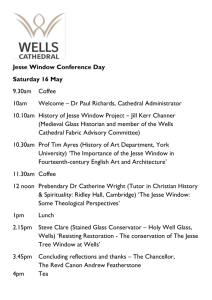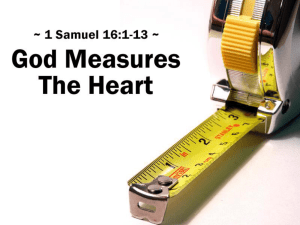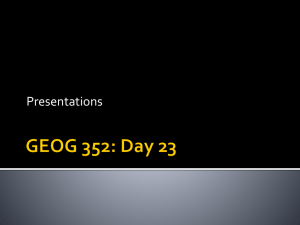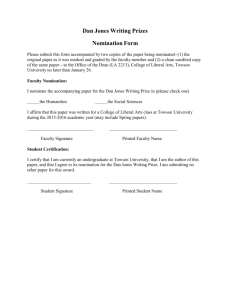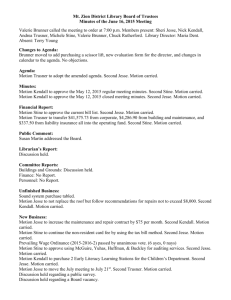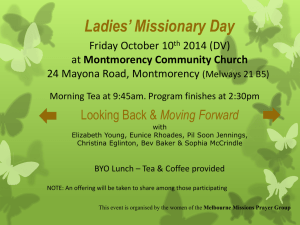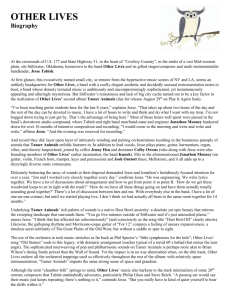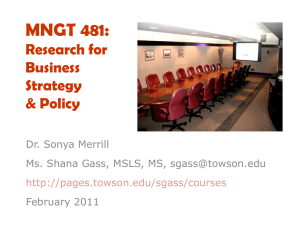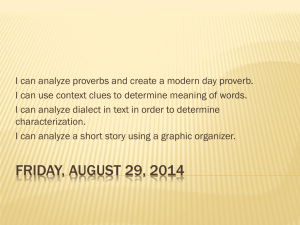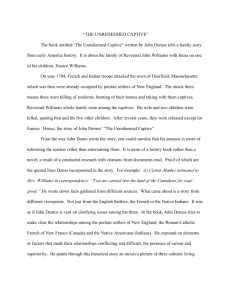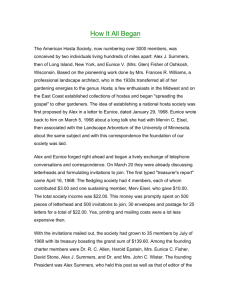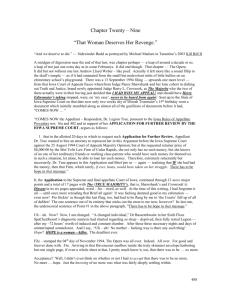Team Constitution - Jesse McKenzie Portfolio
advertisement
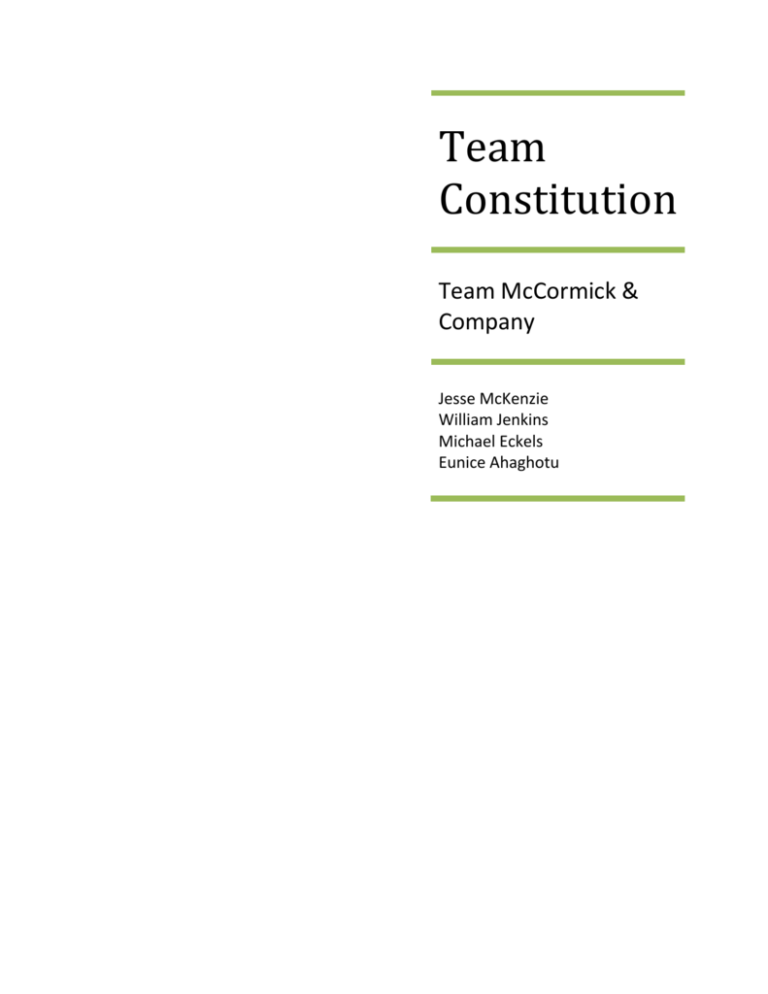
Team Constitution Team McCormick & Company Jesse McKenzie William Jenkins Michael Eckels Eunice Ahaghotu Team Constitution I. Contact Information Jesse McKenzie- Team Leader Email: Jmcken4@students.towson.edu William Jenkins- Librarian/coordinator Email: wjenki3@students.towson.edu Michael Eckels- Document control Email: meckel2@students.towson.edu Eunice Ahaghotu- Presentation designer Email: eahagh1@students.towson.edu II. Mission Statement Team McCormick & Company’s main focus is to sustain a positive team environment where all group members effectively cooperate and communicate to execute superior quality projects. We will do this by listening to every member’s ideas and will incorporate them into each task. Listening to each other will create a positive team atmosphere and allow us to come to vital agreements to move smoothly through the projects. All team members are expected to be engaged in the work and give 100 percent at all times so we can produce assignments to the best of our ability. III. Commitment to Team McCormick & Company 1. I, Jesse McKenzie, will give 100 percent to the team, and maintain a team atmosphere throughout all projects. 2. I, William Jenkins, will promise to always return communication within an hour time period. 3. I, Michael Eckels, will aim to resolve all issues in a cohesive manner. 4. I, Eunice Ahaghotu, will attend all team meeting and contribute my ideas with the team. IV. Meeting Information All team members will be at campus at 6:00pm on Wednesdays and 11:00am on Fridays. We will also use technology such as Email and text messaging to communicate outside of our meetings. We expect technology to help us work around times that all of us are not able to meet in person. V. Prior School and Work Commitments 1. Class Schedules a. Jesse: MW 10am-3pm; TUTH 9:30am-2:50pm; F 10am-10:50am b. William: MW 11am-4:45pm; M 6pm-9:10pm c. Michael: MW 8am-5pm d. Eunice: MWF 9am-10:50am: TU/TH 12:30pm-4:45pm 2. Work Schedules a. Jesse: M/TH 4pm-10pm; SA 3pm-10pm; SU 4pm-8:30pm b. William: TU/TH 8:30am-6pm; SA 8:30am-2:30pm c. Michael: My work hours change weekly, but I work mostly on Sunday,Tuesday, Thursday, and Saturday. d. Eunice: N/A VI. Tools and Organization 1. Computer Software We will use Microsoft Office 2007 as our main choice of software. Also, we will use Google Docs so we can collaborate on work without having to meet in person. 2. Writing and Oral Projects In order to properly organize, design, and format writing and oral projects it will be important to split up responsibilities to individual group members. We will follow proper MLA format; however, we may later come to an agreement to use a different format. For our oral presentations we will set aside ample time to prepare and practice. At the start of a project, we must identify the purpose of our presentation and evaluate what our audience wants to hear and what they already know. We will allow ourselves to have alone time where we can each be at our creative best without any distractions. When we present our information, we will do so in ways that we think will change or influence our audience’s ideas and opinions. To create effective oral and written projects that will clearly and proficiently get our points across we need to maintain proper organization from start to finish. VII. Team Performance In order to reach our goals and achieve the performance desired, it will be important for each member to be responsible in fulfilling their assigned duties on time and to the best of their ability. Furthermore, it will be a necessity for everyone to be engaged in group activities and to encourage each other to do well and communicate effectively. VIII. Evaluating Member Contribution and Performance We will each ask ourselves the following questions about the group members to make sure everyone is contributing and performing well. 1. Reliability – Does the individual complete his/her assignments properly and on time? 2. Effort – Does the individual attempt to spend a reasonable time on the work and step up when needed? 3. Creativity – Does the member bring their individual ideas to the group to inspire new ways of thinking or solutions to any problems? 4. Cooperation – Does the individual keep team goals in mind and work towards accomplishing those goals? 5. Analysis – Does the individual contribute a sufficient amount to the project and exert enthusiasm in helping to carry out research and find necessary solutions? 6. Achievement – Does the individual add to or take away from the success of the assignment? 7. Organization – Does the individual take an efficient and orderly approach when completing tasks? 8. Preparedness – Does the individual come ready to participate with the team? We will also set short term goals throughout every project so that we can stay organized and know where we should be every step of the way. IX. Unacceptable Behavior As a team, we agreed it will be considered unacceptable behavior if one does not show up to meetings, and does not stay in contact and communicate with the group. It is unacceptable if team members do not put forth their best efforts to strive for the betterment of the group. Some examples of this would be being unreliable, lazy, quarrelsome, or unorganized. X. Academic Integrity To ensure honesty throughout our projects we will need to be aware of and check all the sources we use. We will need to re-word material and come up with our own ideas. We should allow ourselves enough time to complete tasks so that we are not tempted to cheat. XI. Termination, Conflict and Disputes If there is a poorly performing group member either through lack of effort, care, etc., the first thing that should be done as a group is to review our team constitution. We would need to review everything we signed and pledged that we would do as a part of this team. Following this, the reason for the conflict would need to be specifically addressed so that a solution could be developed to avoid a member of the team being asked to leave. Similarly, if conflict or disputes arise we must first be certain that it is not merely a case of a disagreement. In such a case, the team would need to discuss and find alternative decisions and come to a consensus that would help enhance not only the project, but the team as a whole through creative problem solving. However, if there is truly a conflict or dispute as a team we must again clarify expectations. Once our expectations are clarified it would be important to identify exactly what kind of conflict we were dealing with. It is then possible to come up with solutions that reinforce the team’s original goals and expectations of each team member. XII. Consensus versus Compromise It is very easy for one person to commandeer a situation and force others to compromise. Or vice versa, someone may stop supporting their own opinion and compromise with the others even if they did not want to. In order to avoid this situation every time a conflict develops, the team must reach a consensus together rather than merely compromising. In a consensus, one side does not have to totally give up their ideas and one side cannot forcefully implement their ideas. The team must come up with an idea or solution that looks at everyone’s ideas and solves the problem by satisfying each side of the conflicting argument. XIII. Practice and Finalization 1. Presentation Practice a. Through dedication to the preparation and practice of our presentations, we will be able to present our material in a professional and appealing manner. We will assign days and times to meet to orally practice presenting our project before the real day. It is important that we go over our presentation multiple times to fix any issues and to make sure we are comfortable. 2. Editing b. Before finalizing and submitting a project, we must review our material multiple times and ask ourselves what can be removed and what are we missing. We will use tools such as spell check. It will be necessary for all members to individually go over an entire project so that there are four people revising and not just one member. We can have others outside our group edit our work to find mistakes we may have overlooked. This will leave us with final error free projects. We have read, understood and hereby agree to the terms and conditions stated above. 2/25/13 Jesse McKenzie: William Jenkins: Michael Eckels: Eunice Ahaghotu:
